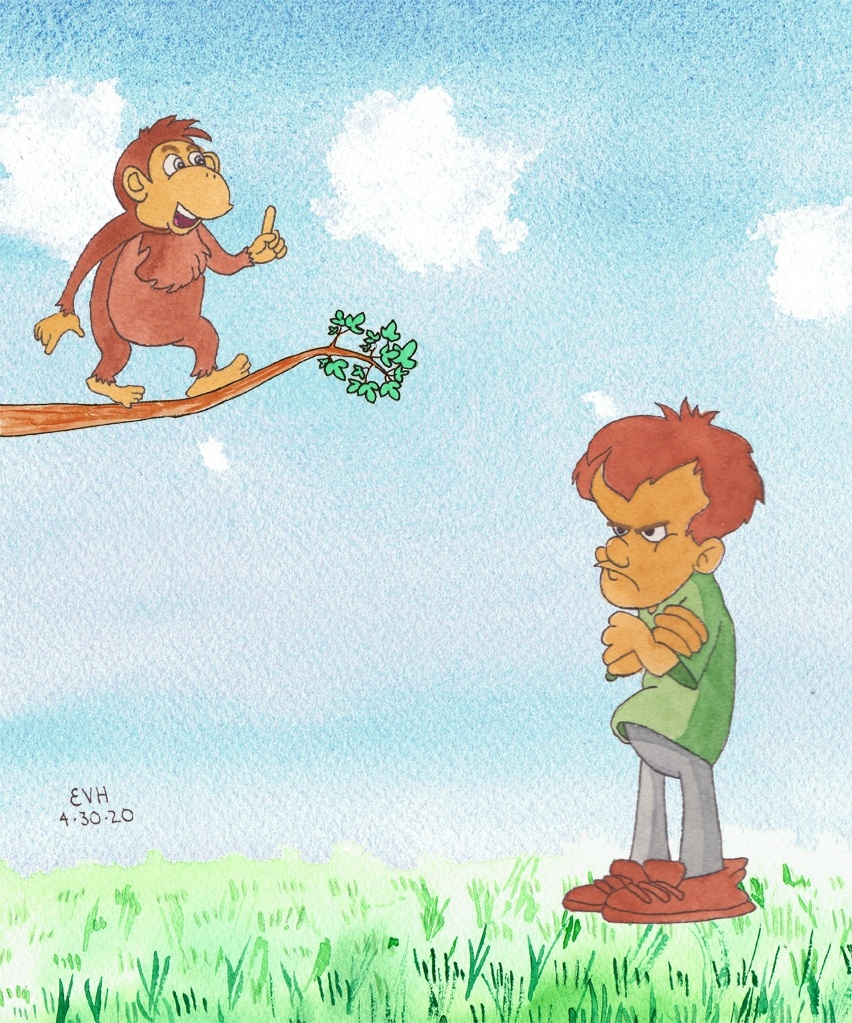
Jataka 249
Sālaka Jātaka
Brother in the Tree
as told by Eric Van Horn
originally translated by William Henry Denham Rouse, Cambridge University
originally edited by Professor Edward Byles Cowell, Cambridge University
A story with a clever monkey and an evil man can never go wrong. In this case, the good guy prevails, but not without some trials.
It may seem curious that in the story-in-the-present a “distinguished elder monk” is the bad guy. But the history of the Saṇgha is full of stories of misbehaving monks and the occasional misbehaving nun. Even in the Saṇgha, people are people. The lesson is not to just blindly assume that a monk or nun will behave properly. The Buddha said that if you really want to know the quality of a person, you must be diligent and inquire fully into the character of that person. An example of this teaching is the Vīmaṃsaka Sutta: The Inquirer [MN 47]. In the Vīmaṃsaka Sutta the Buddha gives instructions on how to tell whether someone is fully awakened. By extension this applies more generally to how to tell if a teacher is true.
“Like my own son.” The Master told this story while he was living at Jetavana. It is about a distinguished elder.
It is said that he had ordained a young man whom he treated with cruelty. Finally, the novice could not stand it any longer and returned to the world. Then the elder tried to convince him to return. “Look here, lad,” he said. “You will have your own robe and your own bowl as well. I have a bowl and a robe that I will give to you. Join us again!”
At first the young man refused, but at last after much pleading he did so. From that day on the elder mistreated him just as before. Again the lad found it too much and left the Saṇgha. And again, just as before, the elder begged him repeatedly to return. The young man replied, “You cannot manage with me or without me. Leave me alone. I will not return!”
The monastics got to discussing this in the Dharma Hall. “Friend,” they said, “that young man was perceptive. He knew the elder too well to join us.” The Master came in and asked what they were talking about. They told him. He responded, “Not only is the lad perceptive now, brothers and sisters, but he was just the same in the past. When once he saw the faults of that man, he would not accept him again.” And he told them this story from the past.
Once upon a time, during the reign of Brahmadatta as the King of Benares, the Bodhisatta was born into a landowner’s family. He earned his living by selling grain. There was another man who was a snake-charmer. He had a trained monkey to whom he had given an antidote to the snake’s venom. He would make the snake play with the monkey. He made his livelihood in this way.
A festival had been proclaimed. The snake-charmer wished to celebrate at the feast. He entrusted the monkey to the merchant, asking him to care for it. Seven days later he went to the merchant and asked for his monkey. The monkey heard his master’s voice and came out quickly from the grain shop. At once the man beat him over the back with a piece of bamboo. Then he took him off to the woods, tied him up, and fell asleep.
As soon as the monkey saw that he was asleep, he loosened his bonds, scampered off, and climbed up into a mango tree. He ate a mango and dropped the stone on the snake-charmer's head. This woke the man up. He looked up into the tree, and there was the monkey. “I will coax him down!” he thought, “and when he comes down from the tree, I will catch him!” So to convince him to come down from the tree, he repeated the first verse:
“Like my own son you shall be,
Master in our family.
Come down, brother from the tree —
Come and hurry home with me.”
The monkey listened, and repeated the second verse:
“You are laughing in your sleeve!
Have you quite forgot that beating?
Here I am content to leave
And go on to ripe mangoes eating.”

Figure: “Have you quite forgot that beating?”
Up he arose and disappeared into the woods, while the snake-charmer returned resentfully to his house.
When this discourse ended, the Master identified the birth: “Our novice was the monkey. The elder was the snake-charmer, and I was the grain merchant.”
